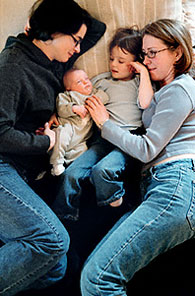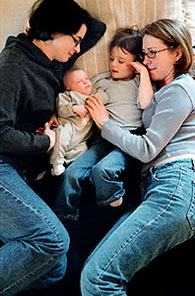A deaf lesbian couple in the US who has deliberately chosen to have a deaf baby has sparked a row about designer babies after admitting that they intentionally sought to parent deaf children by donor insemination.

Sharon Duchesneau and Candy McCullough with baby Gauvin and his sister Johanne.
The couple who have lived together for eight years had originally approached sperm banks looking for a donor who suffered from congenial deafness but have been turned away. They finally found a family friend who was deaf through five generations of deafness to impregnate Duchesneau.
Their five-year-old daughter, Johanne, who is also deaf now has a baby brother, Gauvin. The four-month-old boy is profoundly deaf in his left ear and has only a slight amount of hearing in one ear. Both children were conceived using the sperm of the same deaf man through artificial insemination.
Duchesneau and McCullough who are members of a radical movement in the US, which rejects deafness as a disability, have refused the child a hearing aid.
A report in The Washington Post has described the wealthy pair as: "stylish and independent women in their mid-thirties, both college graduates, both holders of graduate degrees from Gallaudet University, both professionals in the mental health field."
In an interview with the Post, the women who have both been deaf since birth, said they believe deafness is "an identity not a medical affliction that needs to be fixed."
The women also believed that they would make better parents to a deaf child and would be able to understand the child's development more thoroughly and offer better guidance, and said the choice was no different from opting for a certain gender.
"Some people look at it like, 'Oh my gosh, you shouldn't have a child who has a disability,'" said McCullough, the boy's adoptive mother.
"But, you know, black people have harder lives. Why shouldn't parents be able to go ahead and pick a black donor if that's what they want? They should have that option. They can feel related to that culture, bonded with that culture."
The couple's behaviour has appalled children's rights groups in the United States. The conservative Family Research Council said their decision to "intentionally give a child a disability" was "incredibly selfish."
The council's spokesman, Fred Connor, said: "These women are taking the idea of creating so-called designer babies to a horrible new level.''

Sharon Duchesneau and Candy McCullough with baby Gauvin and his sister Johanne.
"The question is whether the parents have violated the sacred duty of parenthood, which is to maximise to some reasonable degree the advantages available to their children. I'm loath to say it, but I think it's a shame to set limits on a child's potential."
Nancy Rarus, a staff member at the National Association of the Deaf, which oldest and largest constituency organization safeguarding the accessibility and civil rights of 28 million deaf and hard of hearing Americans, said it was not unusual for deaf people to want deaf children but said she regretted the decision.
"I'm a social animal, and it's very difficult for me to talk to my neighbours. I wish I could walk up to somebody and ask for information," she said.
"I've had a lot of arguments in the deaf community about that. People talk about, 'the sky's the limit,' but being deaf prevents you from getting there. You don't have as many choices. I can't understand why anybody would want to bring a disabled child into the world."
Duchesneau is however no stranger to the debate on designer babies. She is a medical ethics graduate and worked as an intern in the bioethics department at the National Institutes of Health.
But the debate has so far focused on whether technology should be used to eliminate congenital diseases or disabilities. Many disability and gay organisations have felt threatened by the concept of pursuing "perfect" children.
